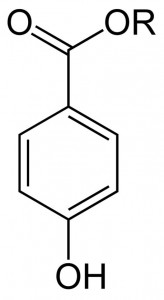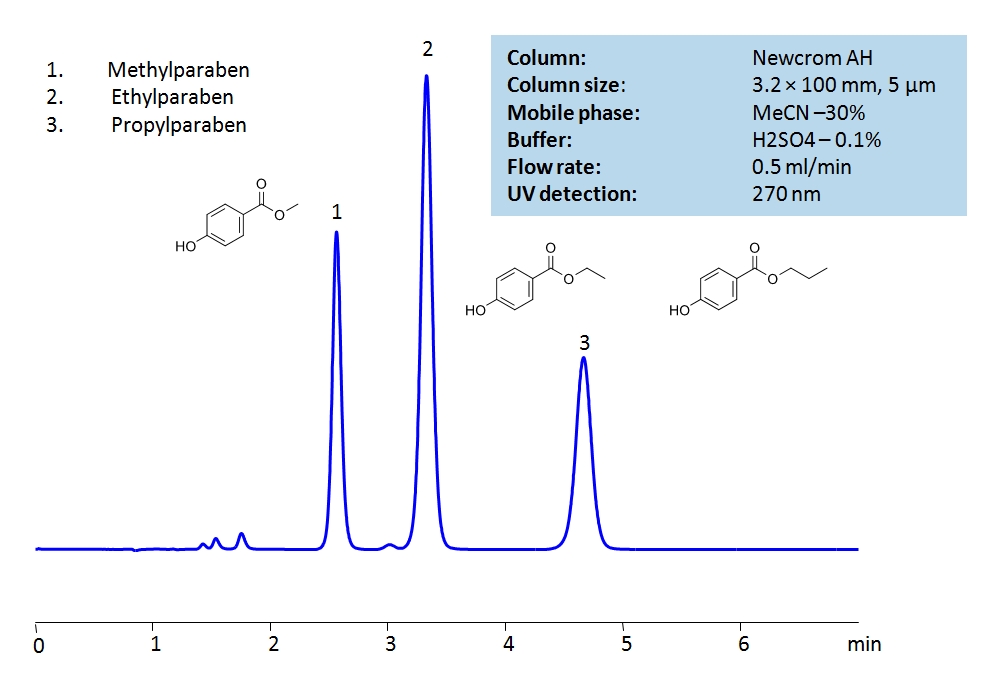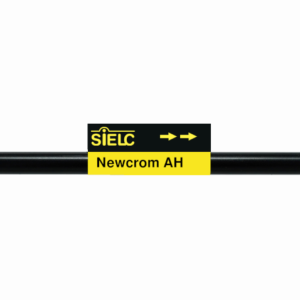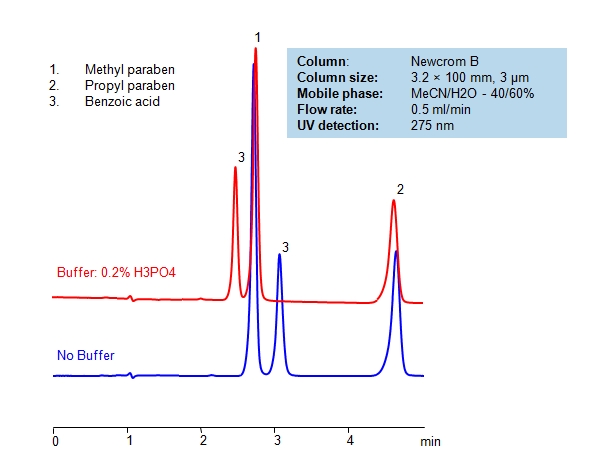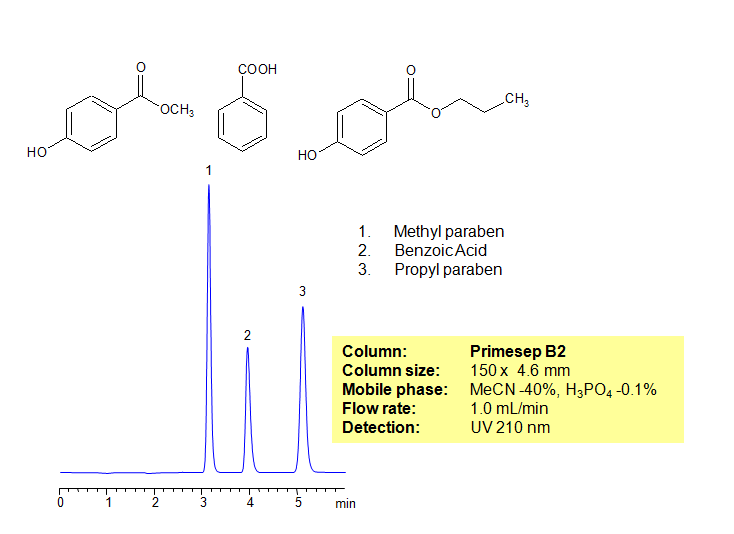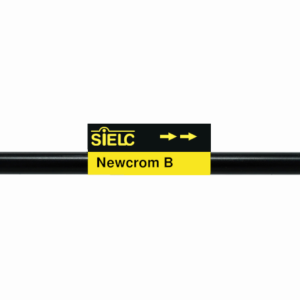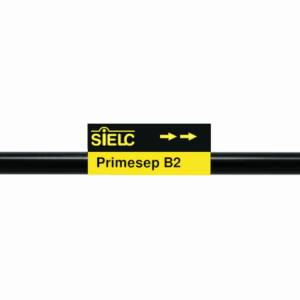Applications:
HPLC Analysis of Paraben Preservatives on Newcrom AH Column
October 29, 2020
HPLC Method for Ethylparaben, Methylparaben sodium, Propylparaben sodium, Methylparaben, Parabens, Propylparaben on Newcrom AH by SIELC Technologies
High Performance Liquid Chromatography (HPLC) Method for Analysis of Ethylparaben, Methylparaben sodium, Propylparaben sodium, Methylparaben, Parabens, Propylparaben.
Methylparaben, also known as Methyl 4-hydroxybenzoate, is a paraben with the chemical formula C8H8O3. It is used as a preservative in food, cosmetics, and pharmaceuticals as it is said to have antimicrobial and antifungal properties. It is considered safe for use in low concentrations, but it may cause irritation or contact dermatitis in rare cases and for those who are allergic.
Ethylparaben is an ethyl ester of p-hydroxybenzoic acid with the chemical formula C9H10O3. It is used as a preservative in food, cosmetics, and pharmaceuticals due to it’s antimicrobial and antifungal properties. There are ongoing debates in regards to it’s safety as it relates to human consumption,
Propylparaben is a n-propyl ester with the chemical formula C10H12O3. It is used as a preservative in food, cosmetics, and personal care products due to it’s antimicrobial properties. Studies show that it absorbs through the skin and remains in the body, leading to the European Union banning it. California had banned it for use in food, but not in other uses.
You can find detailed UV spectra of Methylparaben and information about its various lambda maxima by visiting the following link.
You can find detailed UV spectra of Ethylparaben and information about its various lambda maxima by visiting the following link.
You can find detailed UV spectra of Propylparaben and information about its various lambda maxima by visiting the following link.
Ethylparaben, Methylparaben sodium, Propylparaben sodium, Methylparaben, Parabens, Propylparaben can be retained and analyzed using the Newcrom AH stationary phase column. The analysis utilizes an isocratic method with a simple mobile phase consisting of water and acetonitrile (MeCN) with a sulfuric acid buffer. Detection is performed using UV.
| Column | Newcrom AH, 3.2 x 100 mm, 5 µm, 100 A, dual ended |
| Mobile Phase | MeCN/H2O – 30/70% |
| Buffer | H2SO4 – 0.1% |
| Flow Rate | 0.5 ml/min |
| Detection | UV, 270 nm |
| Class of Compounds |
Preservatives, Hydrophobic |
| Analyzing Compounds | Ethylparaben, Methylparaben sodium, Propylparaben sodium, Methylparaben, Parabens, Propylparaben |
Application Column
Newcrom AH
Column Diameter: 3.2 mm
Column Length: 100 mm
Particle Size: 5 µm
Pore Size: 100 A
Column options: dual ended
Methylparaben
Methylparaben sodium
Parabens
Propylparaben
Propylparaben sodium

HPLC Separation of Parabens and Benzoic Acid
June 5, 2006
| Column | Newcrom B, 3.2×100 mm, 3 µm, 100A |
| Mobile Phase | MeCN/H2O – 40/60% |
| Buffer | |
| Flow Rate | 0.5 ml/min |
| Detection | UV 275nm |
Parabens possess antibacterial and antifungal properties and are therefore widely used in pharmaceutical and cosmetic industries as preservatives in products. Parabens and benzoic acid can be baseline separated in a short time frame using Primesep B2 reverse-phase HPLC column with a simple mobile phase of water, acetonitrile (ACN, MeCN) and phosphoric acid of 0.1% as buffer. UV detection at 210nm.
| Column | Primesep B2, 4.6×150 mm, 5 µm, 100A |
| Mobile Phase | MeCN/H2O |
| Buffer | H3PO4 |
| Flow Rate | 1.0 ml/min |
| Detection | UV, 210 nm |
| Class of Compounds |
Acid, Hydrophilic, Preservative |
| Analyzing Compounds | Methyl paraben, Benzoic Acid, Propyl paraben |
Application Column
Newcrom B
The Newcrom columns are a family of reverse-phase-based columns. Newcrom A, AH, B, and BH are all mixed-mode columns with either positive or negative ion-pairing groups attached to either short (25 Å) or long (100 Å) ligand chains. Newcrom R1 is a special reverse-phase column with low silanol activity.
Select optionsPrimesep B2
The Primesep family of mixed-mode columns offers a wide variety of stationary phases, boasting unprecedented selectivity in the separation of a broad array of chemical compounds across multiple applications. Corresponding Primesep guard columns, available with all stationary phases, do not require holders. SIELC provides a method development service available to all customers. Inquire about our specially-tailored custom LC-phases for specific separations.
Select optionsMethylparaben
Parabens
Propylparaben

